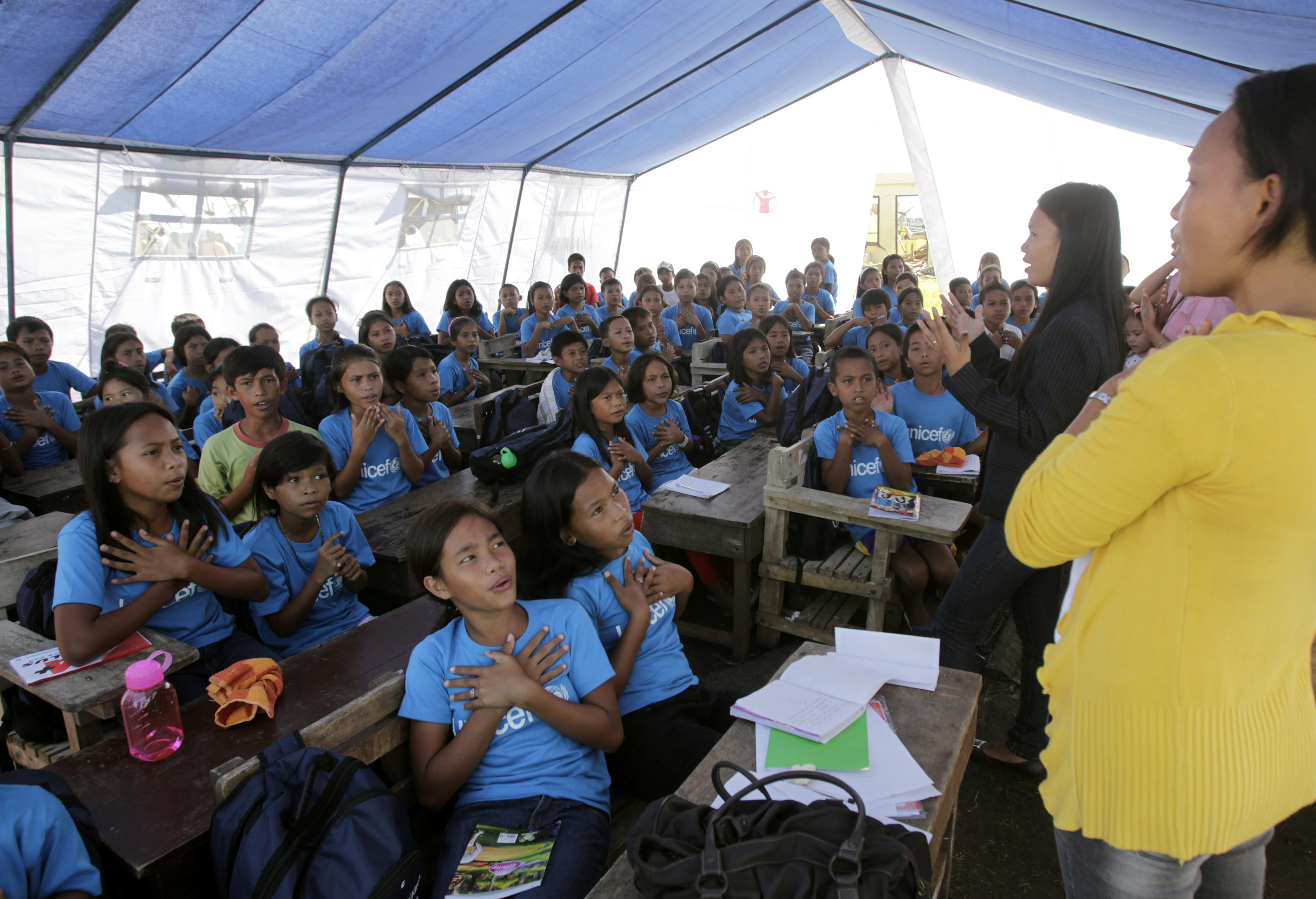Educating for sustainable development encourages responsible global citizens by promoting awareness and action for environmental and social issues. Today’s rapidly changing world demands an education system that not only imparts knowledge and skills but also instills a sense of responsibility towards sustainable development.
Educating for sustainable development aims to create global citizens who are aware, engaged, and committed to taking responsible actions to protect the planet and promote social justice. By integrating sustainable practices and values into educational frameworks, students are empowered to understand the interconnectedness of environmental, economic, and social challenges.
This comprehensive approach encourages critical thinking, problem-solving, and decision-making skills necessary for addressing complex issues and creating a more sustainable future. Through education, individuals can play an active role in advocating for change and making a positive impact on the world.

Credit: www.brookings.edu
The Goals Of Sustainable Development Education
Aligning Education With The United Nations’ Sustainable Development Goals (Sdgs)
Education plays a crucial role in achieving the united nations’ sustainable development goals (sdgs). By aligning educational practices and curriculum with the sdgs, we can foster a sense of responsibility and encourage individuals to become active participants in creating a sustainable future.
Here are key points to consider:
- Integrate the sdgs into education: Incorporate the sdgs into the learning objectives and curriculum content across various subjects. This helps students understand the interconnectedness of global issues and their impact on sustainability.
- Raise awareness: Educate students about the goals, targets, and indicators of the sdgs. This enhances their understanding of the urgent environmental, social, and economic challenges the world faces and empowers them to make a difference.
- Foster critical thinking: Encourage students to analyze complex issues and explore sustainable solutions. This cultivates their ability to think critically and develop innovative approaches to address environmental and social challenges.
- Promote interdisciplinary learning: Emphasize the importance of cross-disciplinary collaboration and encourage students to apply knowledge from different fields to solve real-world problems. This equips them with a holistic perspective and prepares them for collaborative efforts towards sustainable development.
- Offer experiential learning opportunities: Provide hands-on experiences, field trips, and community engagement projects that allow students to actively participate in sustainable practices. This helps them develop a sense of responsibility and empowers them to become agents of change in their communities.
Enhancing Awareness Of Environmental Challenges And Their Impact On Society
Environmental challenges pose significant threats to the well-being of societies worldwide. By enhancing awareness of these challenges and their impact on society, sustainable development education can ignite a sense of urgency and drive individuals towards eco-conscious actions. Consider the following:
- Highlight the interconnectedness: Emphasize how environmental challenges such as climate change, deforestation, pollution, and resource depletion impact various aspects of society, including health, economy, and social equity. This helps individuals realize the gravity of these challenges and the need for collective action.
- Educate about ecological systems: Teach students about the delicate balance of ecosystems and the interdependence of living organisms. This fosters an understanding of the intricate relationships between humans and the environment, motivating responsible behavior towards conservation.
- Encourage sustainable lifestyles: Inspire individuals to adopt eco-friendly practices in their daily lives, such as reducing waste, conserving energy and water, and making ethical consumer choices. This cultivates a sense of personal responsibility and empowers individuals to contribute positively to environmental preservation.
- Promote environmental justice: Shed light on environmental inequalities and the disproportionate impacts of environmental degradation on disadvantaged communities. This encourages students to consider the social dimensions of sustainability and advocate for equal environmental rights and access to resources.
Promoting Social Justice, Equality, And Global Solidarity
Sustainable development education goes beyond environmental concerns and extends to promoting social justice, equality, and global solidarity. By addressing social issues and fostering empathy, it cultivates responsible global citizens. Consider the following points:
- Encourage inclusivity and diversity: Create a safe and inclusive learning environment that values diversity and promotes respect for all individuals. This helps students develop empathy, understand different perspectives, and challenge social prejudices.
- Address social inequality: Highlight issues of poverty, inequality, discrimination, and human rights violations. By raising awareness of these challenges, education can inspire individuals to advocate for a more just and equitable society.
- Foster empathy and compassion: Incorporate stories and case studies that promote empathy towards marginalized communities and encourage students to think critically about solutions. This cultivates a sense of responsibility towards building a fair and compassionate world.
- Promote a sense of global citizenship: Educate students about global issues and encourage them to think beyond national boundaries. This fosters a sense of global solidarity, making individuals aware of their role as responsible global citizens and encouraging collaboration across borders.
Equipping Individuals With The Skills And Knowledge To Take Action
Sustainable development education is not solely focused on raising awareness but also on equipping individuals with the skills, knowledge, and motivation to take action. By empowering individuals, it ensures that they can effectively contribute to sustainable development efforts. Consider the following:
- Develop critical thinking skills: Nurture students’ ability to evaluate information critically and make informed decisions. This helps them navigate complex sustainability challenges and develop sustainable solutions.
- Foster problem-solving skills: Encourage students to identify and analyze problems, as well as develop innovative strategies for addressing them. This equips them with the skills necessary to contribute towards sustainable development.
- Cultivate collaboration and communication skills: Emphasize the importance of teamwork, effective communication, and negotiation in addressing sustainability challenges. These skills are essential for collaboration with diverse stakeholders and achieving common goals.
- Provide practical tools for action: Equip individuals with practical skills such as waste management, sustainable agriculture, renewable energy, and responsible consumption. This empowers them to implement sustainable practices and inspire others to do the same.
- Instill a sense of responsibility: Foster a sense of personal and collective responsibility towards sustainable development. Encourage individuals to believe in their capacity to make a positive impact and emphasize the importance of taking small steps towards a more sustainable future.
By aligning education with the united nations’ sustainable development goals, enhancing awareness of environmental challenges, promoting social justice and equality, and equipping individuals with the skills and knowledge to take action, sustainable development education plays a significant role in creating responsible global citizens committed to building a sustainable future.
Integrating Sustainable Development In The Curriculum
Educating For Sustainable Development: Encouraging Responsible Global Citizens
Infusing Sustainable Development Principles Across Different Academic Disciplines
Sustainable development is not just a concern for environmental science courses; it is a topic that should be integrated across the entire curriculum. By infusing sustainable development principles into various academic disciplines, students can develop a holistic understanding of the interconnectedness and impact of their actions on the environment and society.
Some key points to consider include:
- Science courses can focus on studying climate change, renewable energy, and conservation.
- Social science courses can explore sustainable economic systems, social justice, and inequality.
- Business courses can incorporate sustainable business practices and corporate social responsibility.
- Art and design courses can emphasize sustainable fashion, eco-friendly architecture, and sustainable materials.
Developing Interdisciplinary Courses That Address Sustainability Challenges
A powerful way to foster sustainable development is by developing interdisciplinary courses that address sustainability challenges. These courses bring together students from different disciplines to collaborate and apply their knowledge to real-world sustainability issues. Through interdisciplinary learning, students can develop a deep understanding of complex sustainability challenges and work towards innovative solutions.
Some key points about interdisciplinary courses are:
- Courses can bring together students from environmental science, economics, policy, and engineering, among other disciplines.
- Collaborative projects can encourage creative problem-solving and critical thinking.
- Professors can incorporate guest speakers and field trips to provide real-world perspectives and experiences.
Incorporating Experiential And Project-Based Learning Opportunities
To truly educate for sustainable development, it is crucial to provide experiential and project-based learning opportunities. These methods allow students to actively engage with sustainability issues, develop practical skills, and make a tangible impact in their communities. Some key points to incorporating experiential and project-based learning are:
- Field trips and internships offer hands-on experiences and exposure to sustainability practices in various settings.
- Assignments and projects can focus on real-world sustainability challenges, such as designing eco-friendly products or creating community gardens.
- Students can collaborate with local organizations and community partners to address sustainability issues in their vicinity.
Integrating Sustainable Development Into Formal And Informal Education Settings
Sustainable development should not be limited to formal education settings alone. It is equally important to integrate sustainable development principles in informal education settings, such as after-school programs, community centers, and educational websites. By reaching a wider audience, we can cultivate a culture of responsible global citizens.
Some key points on integrating sustainable development into formal and informal education settings include:
- Developing educational resources that are easily accessible and engaging for learners of all ages.
- Encouraging community participation and involvement in sustainability initiatives.
- Collaborating with non-profit organizations and local governments to promote sustainable practices in educational institutions and the wider community.
By embracing these strategies and infusing sustainable development principles throughout the curriculum, we can foster the development of responsible global citizens who are equipped to address the challenges of our rapidly changing world. Let’s empower our students to become advocates for environmental, social, and economic sustainability, inspiring positive change for future generations.
Teaching Methods And Approaches For Sustainable Development Education
Active Learning Strategies That Encourage Student Engagement And Participation
- Implementing active learning strategies is crucial in sustainable development education as it enhances student engagement and participation.
- Active learning methods encourage students to take an active role in their learning process.
- By incorporating hands-on activities, group discussions, and problem-solving exercises, educators can foster a deeper understanding and appreciation for sustainable development.
- Examples of active learning strategies include field trips, role-playing scenarios, and interactive simulations.
Case Studies And Real-World Examples To Illustrate Sustainability Concepts
- Introducing case studies and real-world examples is an effective way to help students understand and apply sustainability concepts.
- Case studies provide relatable scenarios where students can analyze the impact of various decisions and actions on the environment.
- Real-world examples offer practical insights into sustainable practices already in place and their positive outcomes.
- By studying these cases and examples, students gain a broader perspective on the challenges and opportunities related to sustainable development.
Problem-Based Learning To Foster Critical Thinking And Problem-Solving Skills
- Problem-based learning is an ideal approach to develop critical thinking and problem-solving skills in sustainable development education.
- This method encourages students to investigate and analyze real-life problems related to sustainability.
- By engaging in problem-solving activities, students develop a deeper understanding of the interconnectedness of social, economic, and environmental factors.
- Problem-based learning also promotes creativity and collaboration as students work together to find innovative solutions to complex sustainability challenges.
Collaborative Learning And Group Projects To Promote Teamwork And Global Citizenship
- Integrating collaborative learning and group projects into sustainability education encourages teamwork and cultivates global citizenship.
- Through collaborative activities, students learn to value diverse perspectives and collectively brainstorm sustainable solutions.
- Group projects provide opportunities for students to engage in community-based initiatives and understand the importance of active participation in creating sustainable change.
- By working together towards a common goal, students develop the skills and mindset necessary to become responsible global citizens.
Adopting these teaching methods and approaches in sustainable development education can create a dynamic and engaging learning environment, empowering students to become responsible global citizens. Through active learning, case studies, problem-based learning, and collaborative projects, students gain the knowledge, skills, and mindset needed for a sustainable and prosperous future.
Building Partnerships And Collaboration For Sustainable Development Education
In today’s interconnected world, education for sustainable development is essential in creating responsible global citizens who are equipped to address environmental, social, and economic challenges. Building partnerships and collaborations between educational institutions and sustainability organizations plays a crucial role in promoting this important cause.
Here are some key points to consider:
- Establishing partnerships between educational institutions and sustainability organizations:
- Foster a sense of shared responsibility and collective action towards sustainability.
- Leverage the expertise and resources of both parties to create comprehensive and impactful educational programs.
- Develop joint initiatives that integrate sustainable development principles into the curriculum and extracurricular activities.
- Engaging local communities and stakeholders in sustainable development initiatives:
- Collaborate with community leaders, businesses, and ngos to promote sustainable practices at the local level.
- Involve students in community-based projects that address specific sustainability challenges.
- Raise awareness and facilitate dialogue among stakeholders to build a shared vision for sustainable development.
- Promoting international collaboration for knowledge exchange and global action:
- Encourage partnerships and collaborations between educational institutions from different countries.
- Facilitate cross-cultural learning experiences through student exchanges and joint research projects.
- Share best practices and innovative approaches to sustainable development through international conferences and platforms.
- Encouraging participation in sustainability networks and conferences:
- Connect students, educators, and sustainability professionals through networks and organizations dedicated to sustainable development.
- Provide opportunities for students to attend conferences and workshops to enhance their knowledge and skills.
- Foster a community of practice where individuals can learn from each other, share ideas, and collaborate on initiatives.
Establishing partnerships and collaborations between educational institutions, sustainability organizations, and various stakeholders is key to promoting education for sustainable development. By working together, we can empower individuals and communities to become responsible global citizens who strive for a more sustainable future.
Frequently Asked Questions On Educating For Sustainable Development: Encouraging Responsible Global Citizens
What Is Sustainable Development And Why Is It Important For Education?
Sustainable development refers to a way of living that meets the needs of the present without compromising the ability of future generations to meet their own needs. It is important for education because it equips students with the knowledge and skills to address global challenges and make responsible choices for the planet.
How Can Education Contribute To Creating Responsible Global Citizens?
Education plays a vital role in shaping responsible global citizens by providing them with the knowledge, skills, and values needed to understand and address global issues. It encourages critical thinking, empathy, and a sense of responsibility towards the planet and its diverse communities.
What Strategies Can Educators Use To Incorporate Sustainable Development Into Their Teaching?
Educators can incorporate sustainable development into their teaching by integrating it into the curriculum, promoting experiential learning, fostering a sense of global citizenship, encouraging community engagement, and providing opportunities for students to take action towards sustainability.
How Does Educating For Sustainable Development Benefit Students?
Educating for sustainable development benefits students by fostering their critical thinking skills, developing their ability to solve complex problems, promoting environmental stewardship, enhancing their understanding of global interconnectedness, and preparing them to be responsible and active participants in creating a more sustainable future.
What Role Does Education Play In Achieving The United Nations Sustainable Development Goals?
Education plays a crucial role in achieving the united nations sustainable development goals by empowering individuals with the knowledge and skills needed to contribute to sustainable development. It helps create awareness, mobilize action, promote equity, and drive positive social, economic, and environmental change.
Conclusion
In the quest to create a sustainable future, educating for sustainable development plays a crucial role in shaping responsible global citizens. By providing learners with a deep understanding of the interconnectedness between social, economic, and environmental dimensions, we equip them with the knowledge and skills needed to address the complex challenges of our time.
Through a holistic and interdisciplinary approach, education can inspire young minds to engage in meaningful action, fostering a sense of responsibility and empathy towards the world they inhabit. By promoting critical thinking, creativity, and problem-solving, schools and educational institutions can nurture a generation of individuals who are conscious of their actions, making sustainable choices in their personal and professional lives.
Furthermore, by instilling values such as respect, empathy, and harmony with nature, education can drive the transformational change necessary to create a more sustainable and equitable world. By investing in the education of young minds, we invest in the future of our planet – a future where responsible global citizens lead the way towards a more sustainable world.












